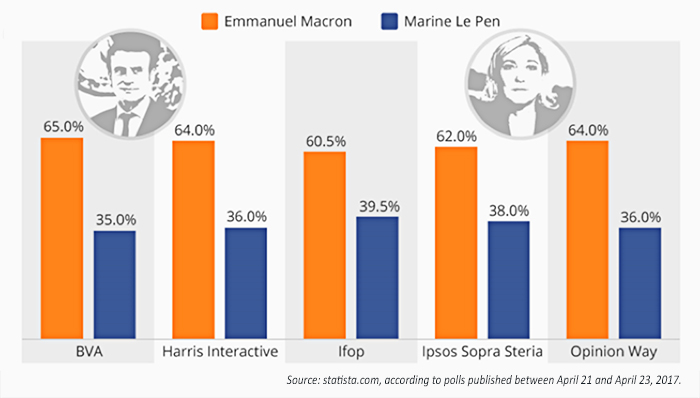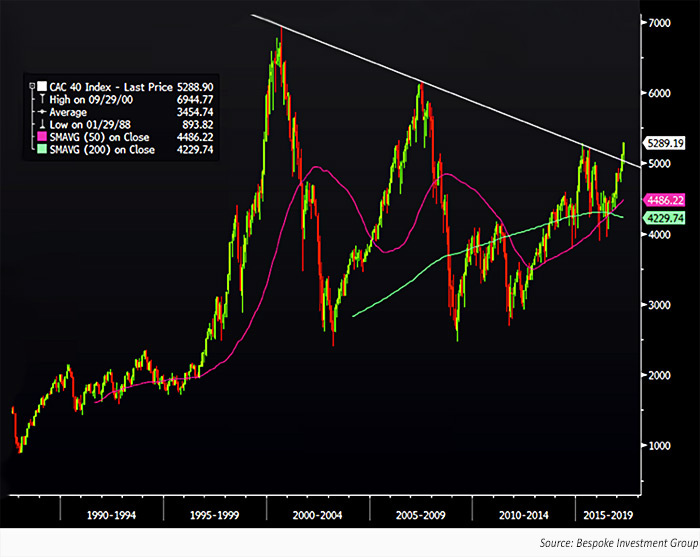
The coverage in the financial press about round one of France’s presidential election has been exhaustive—and for good reason.
A potential win by right-wing candidate Marine Le Pen was viewed by many as having the capability to bring down the common currency and the European Union itself.
According to Julia Coronado of MacroPolicy Perspectives, a Bloomberg radio guest on Monday, the election results and subsequent polling for the May 7 final election meant that “a huge tail risk was taken off the table for Europe.”
About two months ago, Proactive Advisor Magazine previewed some of the French election issues. That article quoted observations from a Forbes piece penned by Katina Stefanova, the CEO and CIO of Marto Capital, who has an impressive international investment management resume. She gave a thumbnail sketch of Le Pen as follows:
Marine Le Pen: nominee of National Front, a right-wing populist and nationalist party.
- Won the FN leadership in 2011. Detoxified the party and softened its image, based on renovated positions and renewed teams.
- Strong opponent of the Euro, advocates France to leave the common currency.
- Pledged to pull France out of NATO (North Atlantic Treaty Organization). …
Le Pen is riding on the current wave of ‘patriotism versus globalization,’ as she has been keen to frame her movement from the start.
Statista published the following poll data shortly after Sunday’s election, along with commentary:
Centrist Emmanuel Macron and far-right leader Marine Le Pen have both progressed to the second round of the French election, as generally predicted. Macron won 23.8 percent of the vote in Sunday’s first round, ahead of Le Pen’s 21.5 percent. Their nearest challengers were centre right François Fillon (19.9 percent) and hard-left Jean-Luc Mélenchon (19.6 percent).
Most other parties are now backing Macron and he is almost certain to win the presidency in the runoff. As the following infographic shows, polls also reflect that sentiment with all them showing Macron as having a considerable lead over Le Pen as they head towards the showdown on May 7th. If Macron does win, he would become the youngest president in French history at 39 as well as being the first who does not belong to a major political party.
MACRON HIGHLY LIKELY TO WIN THE SECOND ROUND
Second-round voting intention in the French presidential election

Ms. Le Pen announced Monday that she would be “temporarily” stepping down as head of France’s National Front party. According to Fox News, Le Pen said on French public television, “Tonight, I am no longer the president of the National Front. I am the presidential candidate. … I have always considered that the president of the republic is the president of all French people.”
Bespoke Investment Group wrote early this week of the May 7 election outlook:
Centrist politicians and pro-Europeans around the European Union breathed a sigh of relief on Sunday night as the second major European election in a row delivered strong results for unabashedly pro-EU and pro-euro parties and platforms. … Le Pen’s chances aren’t zero, but something drastic and radical will have to happen to fundamentally alter the race, and predicting such events is simply impossible.
Bespoke also pointed out that Monday’s rally in France’s equity markets was huge, as post-election positive sentiment surged. “The CAC 40 is having its best day since June 2012, up 4.6%; it’s at 52-week highs and has just broken out across 20-year resistance.” They also note, however, that Europe still faces this fall’s vote in Germany and continued political turbulence in Washington—France’s market breakout still has some headwinds to contend with.
FRANCE’S CAC 40 INDEX BREAKS 20-YEAR RESISTANCE

